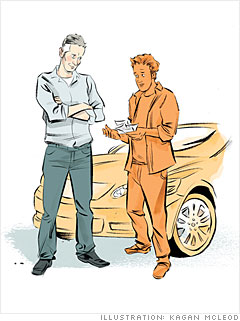Do the right thing in a recession
In a tough economy you may face some hard decisions when it comes to money and your relationships with family and friends. Our ethics experts weigh in on how to handle some particularly thorny dilemmas.

What to do
Economists worry about moral hazard -- the idea that rewarding bad behavior encourages more of it -- and so should you. Good times or bad, there's little virtue in throwing money down a rat hole, no matter how much you love the rat. What your son needs more than your money is a lesson in personal responsibility. As for others more worthy, try to help them (a) if you can and (b) if their request seems reasonable -- reasonable to ask of you and reasonable in that the situation genuinely merits intervention. But be careful. Even in the best of times, personal loans frequently go unpaid, and no law of ethics requires you to lend money you can't afford to lose.
More galleries

